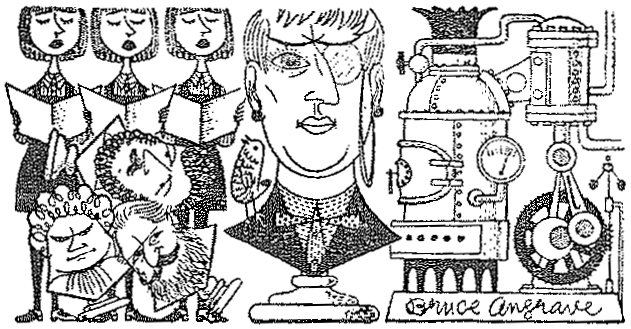I began by typing a few excerpts of Trewin's (and Reed's) best bits. The "best bits" turned out to be the article entire.
Sound BroadcastingDRAMAAlive and Dead
And now we must have the private life of Stephen Shewin. I can hardly wait for it. Henry Reed, who has discovered these curious people—clearly they have been hovering, in a lather of excitement, to come to the microphone—has just reached the story of Hilda Tablet. A very fine story it is. When it appears in print, if poor Herbert Reeve is still alive, it will run into twelve volumes—though that, as Reeve murmured in the plaintive, melancholy-desperate tones of Hugh Burden, must be years and years ahead. Years and years.
You must forgive me. I may be talking to myself, and you may not have met these people. I hope you have. It is eight months since Henry Reed, in the Third, has had his joke at the expense of the conscientious, burrowing biographer. The resolute Reeve looked for the facts beneath the work of the 'poets' novelist', Richard Shewin, and, in the course of his researches, he met the most extraordinary bevy of personages on and around the comic literary fringe. At the time I liked the 'composeress' Hilda Tablet. Now Herbert, even fainter than before, but still pursuing, has saddled himself with another assignment.
The title, 'The Private Life of Hilda Tablet' (Third Programme), says just what has happened. In seeking Shewin, poor Reeve has found Hilda coiling herself furrily about his neck. He is hers forever, and it is going to be a ticklish journey. As someone observes, it needs tact to write the biography of a living subject. And Hilda is living. Undeniably. Her all-woman opera, 'Emily Butter', 'embraces the whole of music'; she has written a quintet for eight instruments ('a lot of instruments for a quintet, I freely grant you'); and she seems to have a passion for adding to her works: at least, to works about her. The idea is simple when it begins: 'A couple of fellows called Faber and Faber are after my life—only 350 pages by this autumn'. But, a few months on, she has resolved, and Herbert has agreed—could he have done otherwise?—that the biography shall be in twelve volumes. It has to have Epic Scope (no doubt Cinemascope as well, if things go much further).
Once more, Mr. Reed has written with the sharpest, wittiest point. Some of his people are old friends; I plead—see first sentence—for a third installment on Stephen Shewin, who still lives, with his wife, in the cat-filled house, shooting his phrases (thanks to Carleton Hobbs) like poison-tipped arrows. But there are new pleasures also. We meet the librettist, who finds Hilda a trifle vexing. Has she not changed the original story of 'Emily Butter', set in the sixteenth century on a boat anchored off Rimini, to something about the bargain basement of a department store? Then there is the Vicar of Mull Extrinseca ('We rub along, you know'), who is delighted that Hilda's embalmed feet are to preserved in the church—in due course. There is the Duchess who begins every sentence with 'One wonders', and who can wonder with surprising effect. There is the Viennese singer who has not yet said 'Goodnight Vienna', though all her attempts are thwarted.
And there is always, and massively, our old acquaintance Hilda herself (Mary O'Farrell), to explain that 'Music fell for me; I was flirting with architecture at the time', or else that she is neither the marrying sort of girl nor a girl who easily offended. 'Please don't mind my saying it', she begins briskly, and at once a storm-cone is hoisted. Mr. Burden is a dolorous joy: then, most of this effort is a joy, though I think Hilda's speech to her old school goes on too long at the end. We know her reasonably well by then, and some of her effects are expected.
Still, the 'Life', which was produced by Douglas Cleverdon, is a cheerful find for what Mr. Reeve-Burden calls 'the ever-admirable Third Programme'. Now let us have a few more poisoned arrows from Stephen Shewin. And his wife, I am sure, can be helpfully elaborated.
[pp. 983-984]
The Private Life of Hilda Tablet was followed by Emily Butter (1954), A Hedge, Backwards (1956), The Primal Scene, As It Were (1958), Not a Drum Was Heard (1959), and Musique Discrète (1959). The plays were collected (not including Emily Butter) in Hilda Tablet and Others: Four Pieces for Radio (British Broadcasting Corporation, 1971). Because of the poor quality of my Listener scan, I have illustrated this post with a picture from the Radio Times for Musique Discrète.








